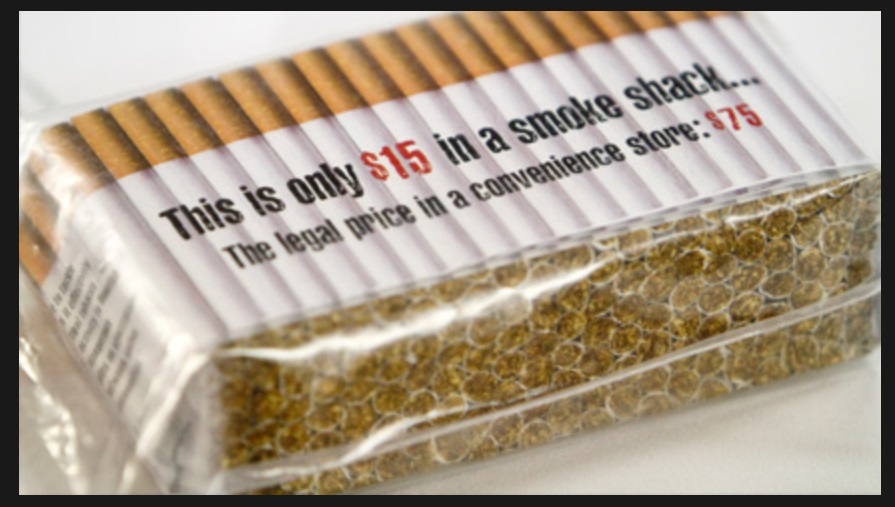Dear Silo, There is a contraband tobacco economy that has sprouted over the past two decades that rivals the volumes that the “Big Tobacco” companies produce for the legitimate market. That black market economy has spawned much criminal activity, false reporting and tax dodging to the point now where the majority of tobacco farmers are complicit in the black market and the marketing board that was set up to regulate the legitimate licensing of tobacco growers has shown itself to be nothing more than a cartel to keep tobacco money in the hands of a self-selected few.
The Federal Government has taken a pass on trying to deal with contraband tobacco except for offering truly stupid tobacco product tax increases that do nothing but drive smokers to the black market. We will hold judgment on the announcement that $90 million will be spent on the contraband tobacco file through the RCMP. To date, the RCMP have not been able to make an impact on the growth of the cigarette black market in Canada. What is certain at this point, however, is that the extra $4 levy on a carton of smokes will drive many current smokers to buy cigarettes that are unburdened by provincial or federal taxes. That will also spur on the commitment of biker gangs and other mobsters to supply the product. Why buy a pack of cigarettes at a gas station for $14 or $15 when you can get 10 packs for the same price under the table?
The TTP Program – A Transition to Chaos
The Canadian Government has much to answer for in the creation of the tobacco diversion schemes in the first place and recent budgetary moves just reinforce the culpability. In 2008 the Federal Government decided that it should spearhead a plan that would enable farmers to leave the tobacco business and migrate their businesses to other, less controversial lines – the Tobacco Transition Program (TTP). As it turns out, it was this TTP idea itself that created a bunch of cheaters out of a bunch of honest farmers.
On August 1, 2008 a press release issued by Agriculture and Agri-Food Canada announced that, “The Government of Canada is providing more than $300 million to Ontario’s flue-cured tobacco producers, including $286 million for a Tobacco Transition Program to help them exit the tobacco industry, and $15 million for community development initiatives.” An average of $272,000 was paid to each participating farmer. By 2015, 133 recipients of over $30 million dollars in TTP money continued to be involved in tobacco growing.
The Ontario Government has been totally inept at dealing with the problem of contraband in the province. In 2012, the Ministry of Finance (MoF) took over responsibility for licensing tobacco growers so as to control the production, distribution, sale and purchase of raw leaf tobacco to help ensure the supply of tobacco stays in the legal market and serves the interests of all tobacco farmers equally. The idea at the time was to take the quota system and self-regulating elements out of the cartel environment and put tobacco sourcing regulation and control in the hands of the government to ensure fairness and transparency – and effective tax collection, one would assume.
We learned that just days after this transfer took effect the Ministry of Finance issued a news release announcing a temporary grace period that would permit growers the time to learn about their obligations and apply for the appropriate registration certificates for the upcoming growing season. That hiatus has now been extended until sometime in 2015 and some think it will be a couple of years after that before the MoF gets its act together.
While the MoF diddles, anarchy reigns. Farmers are under-reporting their yields and selling the overages to the black market for a 400% mark-up from their contracts with the legitimate manufacturers. They claim storm damage but actually siphon off vast amounts of tobacco to sell to the underworld. Sometimes they call the missing tonnage, “stolen”.
Last year, Frontline Security magazine published a series of articles on the contraband tobacco industry. Based on the reporting in that magazine about the involvement of Ontario farmers, FrontLine received a number of calls from farmers who were not involved in the skimming of tobacco yields to contraband but they expressed worry that if their neighbours were making big money selling tobacco at $8 to $10 per pound versus $2 to contracted legitimate manufacturers, why should they miss out?
With each passing season, the moral compass of the Canadian tobacco farmer gets tested and increasingly farmers are succumbing to the pressures of a big payout. The trend is very disturbing. In 2010, it was estimated by FrontLine that more than 60% of 241 farmers were diverting portions of their harvest to unlicensed buyers where the tobacco was heading for illicit markets. Today, it is estimated that 90% of farmers are now involved in siphoning leaf to the black market producers and most of those are producing thousands of pounds for crime based enterprises.
The impact of this moral degeneracy has ripples that go far beyond the rolling hills of tobacco country in Ontario. This past spring, we saw a massive bust in the Montreal area that netted 28 arrests and seizures of 40,000 kilograms of tobacco that were diverted from farms all over North America, including in the Tillsonburg area. A key outcome of that bust was the knowledge that the Italian Mafia have become involved which brings the entire contraband tobacco controversy into a new light and brings the Ontario Tobacco farmers to a new low in conspiring with organized crime.
As alluded to earlier, the farmers aren’t the only ones who have lost their moral compass. In an institutional way, so has the Ontario Ministry of Finance. When the Ministry took over from the chaos in regulation created by the Ontario Flue-Cured Tobacco Growers’ Marketing Board, expectations were that meaningful change was on its way. However, as the Ministry continues to kick it’s responsibility for actual enforcement down the road, it has created a loophole that will inspire many more farmers to engage in producing tobacco that will be diverted to the black market.
Edward R. Myers– freelance journalist and Editor of FrontLine Security magazine.


Ontario failing on contraband tobacco
Tobacco is one of the most common illegally traded goods in the world. In Canada alone, about six billion contraband cigarettes are sold yearly. Sadly, Ontario is ground zero and has the second worst contraband tobacco problem in the Americas, with cigarette volumes on par with El Salvador.
Ontario is also Canada’s epicentre when it comes to illegal manufacturing. Roughly 33 per cent of all cigarettes sold across the province are unlawful, and it’s thought this amount doubles in Northern Ontario.
Contraband smokes are a problem for every Canadian. Legitimate businesses, like corner stores, are impacted, and governments lose significant tax revenue – Ontario alone loses out on over $750 million each year. Most unfortunate is that contraband tobacco is a threat to public safety because the illegal market is fueled by organized crime who are also in the business of drugs, guns, and human trafficking.
Illegal products produced in Ontario are sold across Canada, with British Columbia being the province to most recently sound the alarm bells. I understand other provinces are not pleased with Ontario’s lackluster approach, and I wouldn’t be surprised if some provinces began invoicing us for their additional policing costs.
I’ve worked on the contraband tobacco file for over 24 years now, and despite more intelligence on the file, the problem has worsened in Ontario. On the other hand, Quebec passed legislation that saw success almost immediately. Within the first two years, the rate of contraband tobacco had been reduced to 12 per cent from 33. The ingredients to Quebec’s recipe:
A Contraband Tobacco Enforcement Team of over 50 officers.
Amendments to provincial law allow all police services to investigate contraband tobacco thoroughly.
The establishment of a program that funds ongoing investigations of illegal tobacco.
Recently in the Legislature, I asked the Minister of Finance why Ontario has yet to adopt the Quebec model that equips and assists provincial law enforcement agencies with the necessary tools and funding to combat illegal trade. Interesting to note is that Ontario signaled it would adopt the Quebec model in the 2019 Budget – it was allegedly pulled before print. I asked the Minister who or why the policy was pulled and we haven’t seen it in subsequent budgets, including the one delivered just a few weeks ago. By the way, my question went unanswered by the Minister of Finance’s Parliamentary Assistant, who was subbing that day for Minister of Finance Peter Bethlenfalvy.
More interesting to note is that in 2014 the federal government amended the Criminal Code of Canada – Bill C10 — to create a new offense of trafficking in contraband tobacco and to provide for minimum penalties of imprisonment for repeat offenders. When Doug Ford came to power in 2018, the Ministry of Finance changed the word “contraband” to “unregulated” in the Tobacco Tax Act. In the House, in my supplementary question, I asked the minister to explain that change when it makes it difficult for police and prosecutors to apply the law under such an ambiguous definition. Again, no answer.
These are essential questions, and they deserve answers. Quebec implemented three fundamental changes and made it easier for law enforcement. The recipe for success already exists. I suspect other provinces, tired of dealing with Ontario’s problem, will force this government to prioritize the contraband market. In the meantime, we all suffer.
Bobbi Ann Brady is the MPP for Haldimand-Norfolk